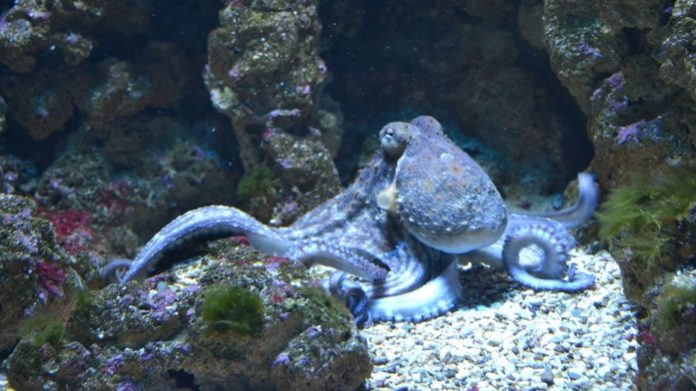Researchers have discovered an octopus city off the coast of Australia and they’re calling it Octlantis. The second such site to be found, Octlantis calls into question the image of octopuses as solitary creatures.
The lost city of Octlantis
On the east coast of Australia, on a rock outcrop about 10-15 metres under the surface of the ocean, up to 15 octopuses make their home – they interact with one another, mate, defend their territory, and even sometimes evict each other. None of these behaviours is odd for an animal, but it is odd based on previously recorded octopus behaviour. Details of the site and what the divers observed can be found in their recently published paper.
Up till now, octopuses have been considered as solitary creatures. In this site, however, there were sometimes up to 11 octopuses occupying just three square metres of ocean floor. That’s probably smaller than your living room.
Octopuses would often encounter one another in this small space: sometimes they would reach out an arm and give the other one a friendly punch, sometimes they would engage in a scuffle. On one occasion one of the octopuses pulled another out of its den. Then, when the evicted octopus moved to another location, the same octopus went and evicted it from that den too.
What came first, the octopus or the den?
What is yet unclear is whether these interactions are welcome or unwelcome. Octlantis is close to a bed of scallops, an abundant food source. When octopuses bring food back to their dens, they are meticulous about cleaning it out, throwing shells and other waste far away from their homes.
Researchers hypothesize that the accumulating pile of shells forms a new place for other octopus dens, so it’s possible that octopuses accumulate there out of convenience and only interact as a side effect.
But the large amount of time the octopuses spent outside of their dens at the site was also mysterious. Time in the open comes with an energy expenditure and risk of predation by sharks.
Stefan Linquist, one of the authors of the paper, is an Associate Professor of Philosophy at the University of Guelph. Specifically, Linquist studies biophilosophy, which he describes as “[examining] the ways that scientists interact with the world and [considering] whether their representations of it (e.g. models and theories) are justified.”
Linquist is likely examining the behaviour of the octopuses and evaluating whether theories about octopus behaviour are justified. See Linquist talking about Octlantis here.
According to a 2006 review, of all the cephalopods, “octopuses are clearly the most solitary and squids the most gregarious, with cuttlefishes in between.” But given this recent discovery, perhaps we are yet to discover the true extent of octopus social interaction and the motivation behind Octlantis.








































